Incredible as it may seem, New Zealand rugby has seen many worse weeks than this last one.
The All Blacks’ 2007 World Cup quarter-final defeat triggered a bitter aftermath that was still being thrashed out on talkback radio four years later; overcome only when Stephen Donald, wearing a shirt designed to fit a beaver, nudged home the penalty goal that helped secure the 2011 cup.
In 1972 it felt like the whole of New Zealand was shocked into standstill when prop Keith Murdoch was sent home from an All Blacks’ tour that was plagued by allegations of a player mafia running roughshod over team management and junior players.
1981 was a watershed year; large swathes of people disconnected from the game forever as a result of the then-NZRFU’s stubborn insistence on trying to prove sport and politics were two separate matters.
The Springbok tour of that year remains a pivotal event in the shaping of New Zealand’s psyche and national identity.
Recency bias has helped push into the background the ‘feats’ of the 1949 All Blacks, losers of all six Tests that year, against South Africa and Australia. Similarly, the 1998 All Blacks dropped five in a row against the same two opponents.
Coach of that side was the outspoken John Hart, a personality far removed from current incumbent Ian Foster.
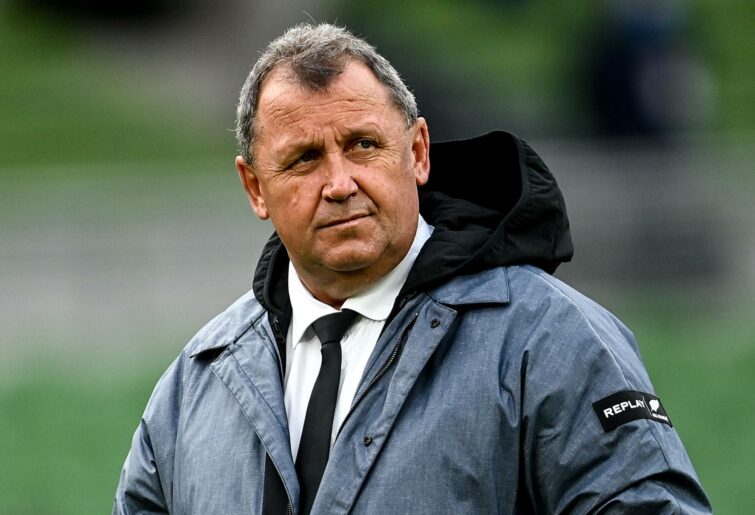
(Photo By Ramsey Cardy/Sportsfile via Getty Images)
The night of 1999’s World Cup shock semi-final loss to France, where Hart had insisted on playing champion fullback Christian Cullen out of position at centre, I piled into a minivan for the ride back from Twickenham to central London and found myself jammed in the back seat alongside one of New Zealand’s most famous All Black forwards.
Filthy doesn’t even begin to describe his mood. It’s fair to say that if Hart had accidentally stumbled into the same van, said All Black forward would have deposited Hart from the van, limb by limb, each one through a different window.
Yes, nobody does rugby hurt quite like New Zealand.
Among the factors driving the intense public backlash in 2022, which represents a profound problem for Foster, is that expectations have been set impossibly high. Ironically, this benchmark is something he himself has been party to, as assistant coach during Steve Hansen’s successful reign.
New Zealand is the only rugby nation to have recorded more wins than losses against every other Test nation. They have won three World Cups. Between 2000 and 2009, the All Blacks won 100 Tests, at a 92 per cent success rate.
In 2013, the All Blacks went through the whole year undefeated, and in 2015-2016 they recorded 18 consecutive wins.
In that context, Foster’s record looks sickly; four losses from the last five matches, to Ireland and France, with Test rugby’s toughest road trip – two Tests in South Africa – looming.
From the frying pan into the fire and all that. Reminiscent of the rabbit who is told by his doctor, “I’m terribly sorry but the news is bad. You’ve got Myxomatosis. It’s terminal.”
“Oh dear. Anything else?” asks the rabbit.
“Well, yes. You’re also suffering from Alzheimer’s.”
“That’s not so bad,” says the rabbit. “Thought for a minute you were going to tell me I had Myxomatosis!”
Today’s talkback radio shows are the comments sections and forums attached to online articles. Unsurprisingly, these have provided a wild ride in recent days; a rollicking mishmash of reasoned argument, slander, raw emotion, despair, and the downright unhinged.
While Foster and his besieged team stare down the prospect of taking on the Springboks, one theme that caught the eye was the idea that winning in South Africa would be a disaster, because it would allow Foster to stay on as coach.
Since when did winning in South Africa become a bad thing? Wouldn’t that demonstrate the very spirit and expertise fans are pleading for?
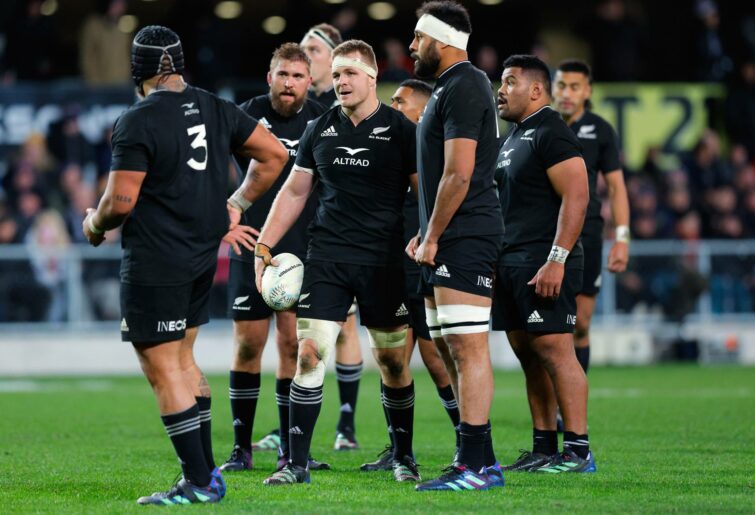
(Photo by Hagen Hopkins/Getty Images)
The explanation is that once the mob has moved on, almost nothing is going to shift opinion. No matter that the mountains of evidence put forward to confirm Foster’s incompetence around selection, contradicts itself at every turn.
For fun, try asking a group of All Blacks fans their preferred starting loose forward trio. Bet you never realised there were so many different combinations of three.
None of the biffo around selection matters so much when you’re winning, which – to return to the nub of the problem – the All Blacks aren’t.
The reasons for that are likely to be many; a lot of smaller factors all coming together to tip the scales in the wrong direction. One is just dumb luck; the All Blacks were thrown into card chaos in Dunedin, not all of it of their own making, unjustly prevented from having their best player return to the field.
And when the tables were reversed in Wellington, with the All Blacks in the midst of a long-awaited comeback, the match officials decreed to treat Ireland far more leniently than they had been treated the week before.
This argument is not to suggest that the results would have been reversed, or that if they were, this wouldn’t represent papering over cracks that are better exposed, but to provide context.
Selection is an issue across a number of positions, but can largely be distilled down to two key areas.
One is the midfield, where everything that Bundee Aki and Robbie Henshaw demonstrated last weekend – cohesion in attack and defence, skill execution, two players entirely understanding all facets of their role – is everything that the All Blacks’ midfield hasn’t been since the retirement of Ma’a Nonu and Conrad Smith.
Another key issue is the failure to solve issues of balance in the loose forward trio, once Sam Cane, as captain, and Ardie Savea were deemed automatic picks.
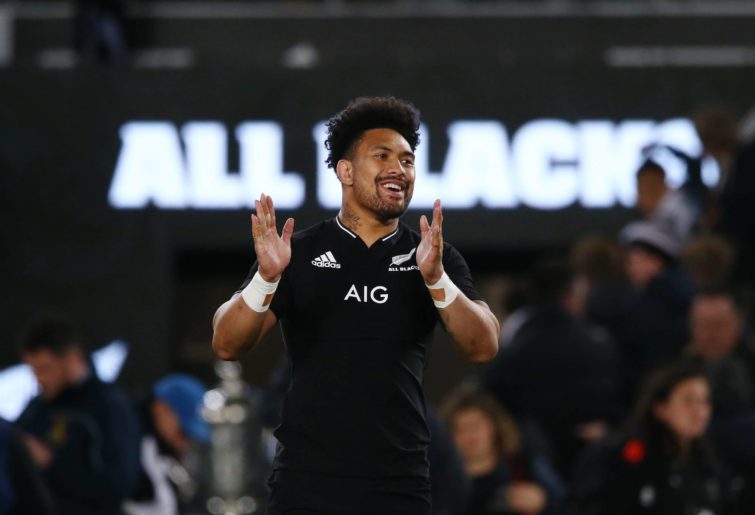
(Photo by Anthony Au-Yeung/Getty Images)
The better sides in international rugby have universally opted for size; to shore up their lineout, provide a bigger ball-running presence, and to give them a better, more combative defensive plug around the breakdown.
At No.8, Gregory Aldritt has two stone on Savea. Athletes like Courtney Lawes and Pieter Steph du Toit have transitioned from lock to loose forward without compromising their team’s mobility.
The All Blacks dipped a toe in this water with Scott Barrett’s selection at 6 for the first Ireland Test, but subsequent events took this off the table.
For the two Tests in South Africa, Barrett has been selected at lock. Has a reassessment been made or is this necessitated by New Zealand’s stocks at lock being so thin?
In the short term, this is Foster’s problem to solve. If he can’t, then the calls for him to stand aside are fair and just; irrespective of the fate suffered by his assistants, John Plumtree and Brad Mooar.
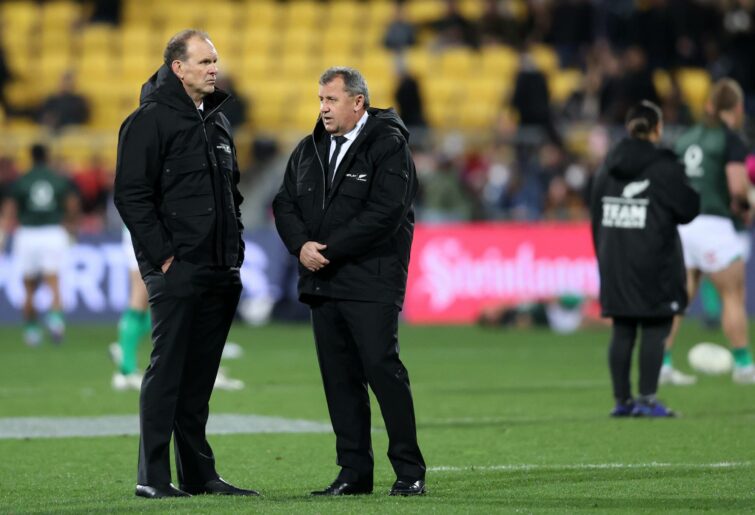
(Photo by Phil Walter/Getty Images)
In terms of strategy, with Joe Schmidt now officially on board, there is opportunity to reset; to refine and implement a game plan that isn’t predictable and passive.
That this will have to be foisted on the players in the middle of the season, and not in a pre-season camp following last season’s review, is an indictment on Foster. He will have to hope both he and his men are fast learners.
In the bigger picture, there are concerns that New Zealand’s much lauded player conveyor belt is in need of a grease and oil change.
Turning school rugby into an arms race for elite, professional academies has provided opportunities for starry-eyed boys to be fast tracked into Super Rugby and the NRL.
But much of the fun being taken out of the sport has also left many others prematurely burnt-out, and has flowed into affecting general participation rates.
Examination of the national under 20s pathway tells an interesting tale.
New Zealand’s 2015 world champion side from Italy spawned three current or established All Blacks (Akira Ioane, Jack Goodhue and Anton Leinert-Brown), one new selection (Aidan Ross), and three who have been and gone (Atu Moli, Te Toiroa Tahuriorangi and George Bridge).
The 2017 world champion side from Georgia contained Will Jordan and Dalton Papalii, plus Braydon Ennor, Caleb Clarke, Stephen Perofeta, Asafo Aumua and Luke Jacobsen.
Following that, the 2018 side came fourth, providing only Hoskins Sotutu, selected for South Africa, although yet to prove himself as an All Black.
In 2019, New Zealand finished seventh, losing to South Africa and Wales. All Blacks from that side were Tupou Vaa’i, Cullen Grace, Leicester Fainga’anuku and Quinn Tupaea; all of them, unsurprisingly given their age, still in the process of establishing themselves at the top level.
This feels like a modest, declining return. Is it any surprise that U20 sides that have performed moderately or worse at world tournaments, have subsequently failed to provide players for the All Blacks? And that this correlates with a decline in the performance of the All Blacks?
Talent identification in age group squads is notoriously fickle. For every Will Jordan, there are tens of contenders for whom selection comes down to luck, or what the vibe is. And some years, compared to others, the talent just isn’t there.
New Zealand is entitled to nothing in perpetuity. Other nations haven’t stood still; not at U20 level, nor with respect to developing their club systems and competitions, upskilling their coaches and players, and strengthening their national programs.
One striking example stands out from the 2019 World Cup. Not the semi-final loss to England, as comprehensive as that was, but the pool match against Namibia, a side that in ‘normal’ times, the All Blacks would have been expected to slaughter.
In the end, the score blew out, but at 10-9 after half an hour, what caught the eye was the rugby being played by Namibia. Coached by canny Welshman Phil Davies, now World Rugby’s Director of Rugby, Namibia exhibited the dash, skill and style, coupled with Japan’s wins over Ireland and Scotland, that demonstrates just how small the rugby world has become.
Over New Zealand’s golden era, skills coach Mick Byrne, and mental skills coach Gilbert Enoka provided a distinct competitive advantage. Byrne is now head coach with the Fijian Drua, while Enoka has been attached to the All Blacks since 2000.
Twenty-two years is an incredible tenure by professional sports standards, but it is also a long time for any voice to retain cut through.
New Zealand’s much envied innovation vanguard has been neutered; not in 2022, but eroded over time, because in rugby’s global order there are few secrets, and because the game itself – the laws and the way in which rugby is currently coached, refereed and played – does not easily lend itself to any nation getting ahead of the curve.
What was innovative was the manner in which NZ Rugby this week managed to escalate the sh*tshow that was the series loss to Ireland, into a fully fledged sh*tstorm.
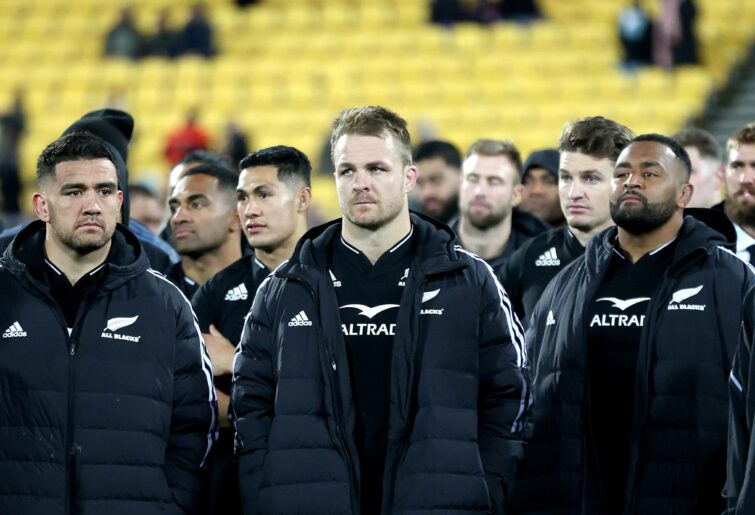
(Photo by Phil Walter/Getty Images)
A scheduled Sunday press conference was cancelled without notice, a belated and unconvincing explanation followed, before NZ Rugby retreated to its bunker, and subsequent pressers confirmed two selection changes for South Africa and the exit of Plumtree and Mooar.
To be fair, nothing less than Foster offering his head would have satisfied some, but in all of this turmoil there is a heavy whiff of chickens finally coming home to roost.
Let me qualify by saying that my personal experience has never been anything other than being afforded respect, courtesy and candour by the NZ Rugby executives, officials, selectors, coaches and players I’ve met.
However, it is also the case that rugby journalists, week to week in the trenches, have not always been afforded those courtesies by the All Blacks’ management team.
“Better people make better All Blacks” has not always applied to some individuals more comfortable operating in a master-servant environment.
This has been called out by commentators in recent days as arrogance. Not at all unfairly, albeit a kinder view might be that this is typically reflective of the hubris that can mark the end of a sustained run of sporting, business or political success.
It can be painful and embarrassing when this kind of thing comes to the surface, but in the manner in which things run in cycles and require regeneration, getting sat on one’s arse in order to re-set is healthy.
NZ Rugby is also dealing with continuing conflict over the structure and composition of professional rugby in the region from 2024 onwards; to an extent something it bought upon itself last year via a ham-fisted and discourteous approach.
If Rugby Australia was to follow through with its threat to exit Super Rugby, that would indeed cap off a horror year for New Zealand. A high-performance program that has at its heart, the same five Kiwi franchises belting the living suitcase out of each other every week is unsustainable for TV, players and fans.
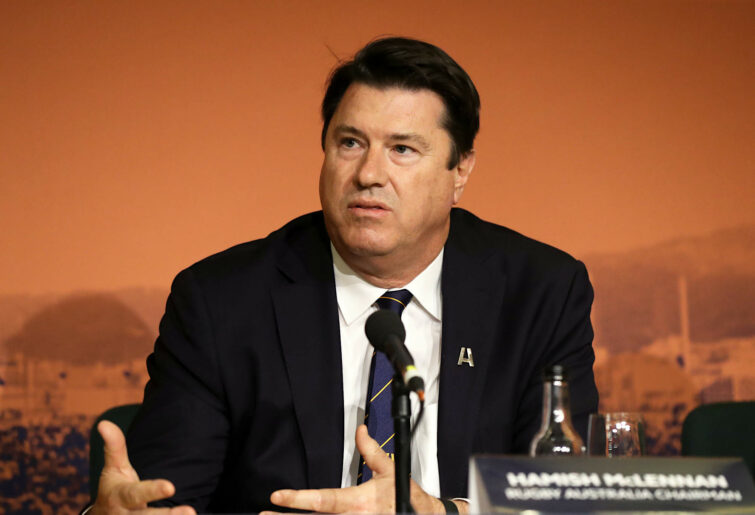
Will Hamish McLennan spearhead Australian clubs’ exit from Super Rugby? (Photo by Oisin Keniry – World Rugby/World Rugby via Getty Images)
The smart money, however, is on Rugby Australia returning to the grown-ups table. Australia’s leading coaches understand the need for their players to continually test themselves at the highest level.
Spare a thought too for Australia’s five franchise CEOs, in the midst of trying to drive 2023 membership numbers for the very competition that head office is publicly undermining.
With the 2027 and 2029 World Cup hosting safely locked in, Phil Kearns has taken on the role of chief attack dog, airing conflict of interest concerns against NZ Rugby board member Bart Campbell, for the role his private business played in bringing several high-profile soccer teams to Australia in the middle of an England-Wallabies series.
Inconveniently for Kearns, his phoney war was launched on the same day as Rugby Australia issued a press release trumpeting interaction between Wallabies and Aston Villa players, and the Melbourne Rebels made their new gym available for exclusive use by Manchester United.
World Rugby were also quick to emphatically refute any suggestions Campbell had broken any code of conduct.
Given rugby’s global commercial power imbalances, the idea that Rugby Australia and NZ Rugby should be enemies is nonsensical.
But if Kearns and Rugby Australia chairman Hamish McLennan insist upon fuelling such a fire, they might do well to observe a time-honoured tenet: “when your enemy is making a mistake, don’t interrupt them”.
After all, it is clear that New Zealand rugby is more than capable of engineering its own sh*tstorm.


































































































